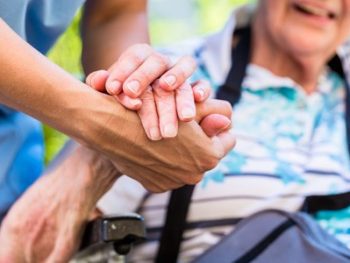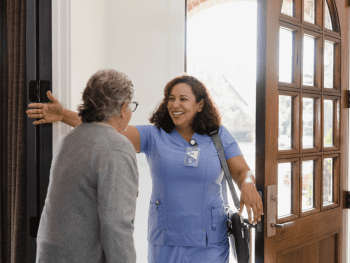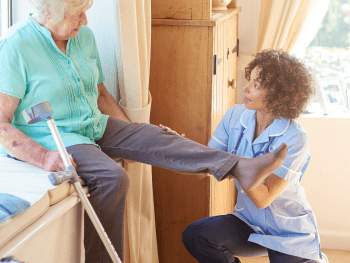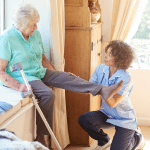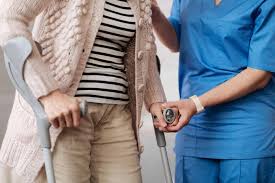 March is National Social Worker month and Pemi-Baker Hospice & Home Health wants to celebrate their social workers- Shannon Cassidy, BSW and Lauren Bell, BSW by explaining the details of Palliative and Hospice social work. The mission of hospice and palliative care social workers is to help clients and their families manage difficult situations and illnesses with dignity and peace of mind.
March is National Social Worker month and Pemi-Baker Hospice & Home Health wants to celebrate their social workers- Shannon Cassidy, BSW and Lauren Bell, BSW by explaining the details of Palliative and Hospice social work. The mission of hospice and palliative care social workers is to help clients and their families manage difficult situations and illnesses with dignity and peace of mind.
The Difference between Hospice and Palliative Care
While related, hospice and palliative care are distinct from each other in several key ways. Palliative care can begin at diagnosis and at the same time as treatment. Palliative care is focused on providing patients with relief from the symptoms, pain and stress of a serious illness. Palliative care also applies to patients who require non-curative remedies for painful or debilitating symptoms in their daily lives.
Hospice care begins after treatment of the disease is stopped and when it is clear that the person is not going to survive the illness. Hospice care involves caring for patients who are suffering from terminal illnesses that have progressed to the point that they have fewer than six months to live.
 What Does a Hospice or Palliative Care Social Worker Do?
What Does a Hospice or Palliative Care Social Worker Do?
The main responsibilities of Palliative and Hospice care social workers include conducting psychosocial assessments, coordinating care, providing counseling and psychotherapy, intervening in client crisis situations, and educating clients and families about their treatment plan and the resources and support systems available to them. Patients and their families are experiencing a number of hardships, including anger and anxiety; depression; financial strain; intense physical pain or discomfort; social isolation; and family conflict.
- Psychosocial assessments- Hospice and palliative care social workers conduct assessments of clients and their families to determine their psychological, social, emotional and spiritual needs. This information is important for the larger hospice and/or palliative care team to develop an effective and compassionate care plan.
- Care coordination- Hospice social workers coordinate the care of patients with a team of medical and human service professionals. With their knowledge of systems of care and support within medical settings and the larger community, hospice and palliative care social workers are often the point of contact between different care providers, as well as the liaison between clients and their treatment team. Hospice and palliative care social workers also play an important role in patient intakes and discharges. During the intake process, they gather data from patients upon their enrollment in a care program (through the psychosocial assessment), orient patients and their families to the hospice or palliative care environment and communicate with the treatment team regarding patients’ ongoing needs. They advocate on behalf of the patient and the family helping them understand their treatment plan and how to be vocal about their needs.
- Counseling- Hospice and palliative care social workers also provide emotional support, counseling and psychotherapy to clients and their families who are experiencing psychological and emotional difficulties in the face of terminal, debilitating illness or both. Social workers may employ a combination of clinical social work modalities to help their clients evaluate and manage their thoughts and emotions and overcome various behavioral challenges.
- Patient education and resource navigation services- Hospice social workers help clients and their families navigate planning for end-of-life care, educating the patient and family on filling out Advanced Directives and/or obtaining guardianship. They also help clients and their families understand their treatment plan and the processes involved in hospice and palliative care. They help families navigate relevant resources and assistance available to them connecting them with local resources, such as cancer or terminal illness support groups, pro bono counseling services and religious communities.

- Crisis intervention-Social workers help intervene in a crisis and can connect families to other support services and resources near them.
Hospice and palliative care social work is challenging work, as it involves helping people through difficult and stressful times of their lives. However, the rewards include making strong connections with people, learning and celebrating their life stories, and having a positive impact on clients and their families. “As Hospice and Palliative care social workers we strive to provide the best resources, education and assistance to clients and their families. Our primary goal is to ensure you and your loved ones are presented with options and education based on your current and long term needs to create the best possible outcome” said Lauren Bell, BSW, Pemi-Baker Hospice & Home Health’s Hospice & Palliative Care Supervisor.
If you feel you or a loved one might benefit from Pemi-Baker’s Palliative or Hospice team, please call us for more information. You do not need a referral from your doctor and there is no charge for a consultation.
Currently, Pemi-Baker Hospice & Home Health is hiring for a part time home health and hospice social worker position. Call for details or visit our page on Indeed.
With over 55 years of experience, serving clients from 29 towns in central and northern New Hampshire, Pemi-Baker Hospice & Home Health is committed to creating healthier communities. Services include at-home healthcare (VNA), hospice and palliative care, and Community Programs including: American Red Cross CPR/AED/FA, Caregiver Support Groups and Grief and Bereavement Support Groups. Providing compassionate care with experienced staff who are trained, certified professionals in the business because of their hearts. In your time of need, we’re right where you need us.
Pemi-Baker is located at 101 Boulder Point Drive, Suite 3, Plymouth, NH. To contact us please call: 603-536-2232 or email: info@pbhha.org Like our Facebook Page: @pemibakerhospicehomehealth




 Another benefit that at-home therapy provides, is the opportunity to assess the safety and accessibility of the home environment. A therapist’s trained eyes can spot fall hazards or bathroom dangers and provide helpful preventive advice.
Another benefit that at-home therapy provides, is the opportunity to assess the safety and accessibility of the home environment. A therapist’s trained eyes can spot fall hazards or bathroom dangers and provide helpful preventive advice. The existence of hospice makes this level of freedom available to many who otherwise would not have had it. Hospice care offers 24/7 clinical support, medication and pain management, assistance with daily living activities, medical supplies and equipment, volunteer support and companionship, social, spiritual and grief support from social workers and chaplains, for the whole family.
The existence of hospice makes this level of freedom available to many who otherwise would not have had it. Hospice care offers 24/7 clinical support, medication and pain management, assistance with daily living activities, medical supplies and equipment, volunteer support and companionship, social, spiritual and grief support from social workers and chaplains, for the whole family. The elderly who wish to retain the freedom of staying in their home and ending their lives on their own terms experience true psychological benefits. Their comfortable surroundings allow them to end their lives with a sense of dignity, which is incredibly valuable. In fact, home care harkens back to older days, when tending to the terminally ill at home was the standard. There’s always the added benefit of being closer to their loved ones in their final days.
The elderly who wish to retain the freedom of staying in their home and ending their lives on their own terms experience true psychological benefits. Their comfortable surroundings allow them to end their lives with a sense of dignity, which is incredibly valuable. In fact, home care harkens back to older days, when tending to the terminally ill at home was the standard. There’s always the added benefit of being closer to their loved ones in their final days.
 With over 50 years of experience, serving clients from 28 towns in central and northern New Hampshire, Pemi-Baker Community Health is committed to creating healthier communities. Services include at-home healthcare (VNA), hospice and palliative care, on-site physical and occupational therapy and aquatic therapy in their 90-degree therapy pool. Providing compassionate care with experienced staff who are trained, certified professionals in the business because of their hearts. In your time of need, we’re right where you need us.
With over 50 years of experience, serving clients from 28 towns in central and northern New Hampshire, Pemi-Baker Community Health is committed to creating healthier communities. Services include at-home healthcare (VNA), hospice and palliative care, on-site physical and occupational therapy and aquatic therapy in their 90-degree therapy pool. Providing compassionate care with experienced staff who are trained, certified professionals in the business because of their hearts. In your time of need, we’re right where you need us.


 We will be making use of GRIEF ONE DAY AT A TIME by Alan D. Wolfelt, PhD. Dr. Wolfelt is a noted grief educator, having written several books about healing personal grief. His expertise derives from his compassionate interaction and caring service with mourners, listening to and reflecting on their responses to loss. He is the Founding Director of The Center for Loss and Life Transition in Fort Collins, Colorado. Although our group is offered for support rather than clinical intervention, the use of reading materials for the purpose of self-care and personal growth and healing is sometimes called bibliotherapy. The books will be made available at our first session of the group. We ask, if possible, for group members to make a donation toward defraying the cost of purchasing the books which group members will be able to keep for themselves. No one will be turned away if they are unable to make a donation.
We will be making use of GRIEF ONE DAY AT A TIME by Alan D. Wolfelt, PhD. Dr. Wolfelt is a noted grief educator, having written several books about healing personal grief. His expertise derives from his compassionate interaction and caring service with mourners, listening to and reflecting on their responses to loss. He is the Founding Director of The Center for Loss and Life Transition in Fort Collins, Colorado. Although our group is offered for support rather than clinical intervention, the use of reading materials for the purpose of self-care and personal growth and healing is sometimes called bibliotherapy. The books will be made available at our first session of the group. We ask, if possible, for group members to make a donation toward defraying the cost of purchasing the books which group members will be able to keep for themselves. No one will be turned away if they are unable to make a donation. Guy Tillson, PBCH Hospice Spiritual Counselor and Bereavement Counselor, online via email at
Guy Tillson, PBCH Hospice Spiritual Counselor and Bereavement Counselor, online via email at  Whenever a person is about to be admitted to hospice end-of-life care, a social worker meets with the patient, family, and other caregivers to advise them of the various supportive services that are part of
Whenever a person is about to be admitted to hospice end-of-life care, a social worker meets with the patient, family, and other caregivers to advise them of the various supportive services that are part of 

 certain activities that once seemed simple can become more difficult to manage.
certain activities that once seemed simple can become more difficult to manage. nal and physical therapy when he gets home following knee surgery. The nurse can help your Mom learn to manage her medications safely and help her learn ways to manage her overall health more effectively. Occupational and physical therapy will provide training on the best exercises Dad can do to strengthen his knee so he can get back to doing the things he enjoys.
nal and physical therapy when he gets home following knee surgery. The nurse can help your Mom learn to manage her medications safely and help her learn ways to manage her overall health more effectively. Occupational and physical therapy will provide training on the best exercises Dad can do to strengthen his knee so he can get back to doing the things he enjoys. How does a patient access skilled home health thru Pemi-Baker Community Health?
How does a patient access skilled home health thru Pemi-Baker Community Health?



